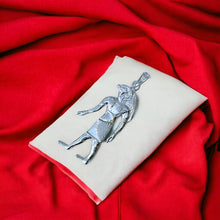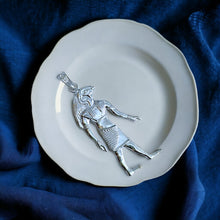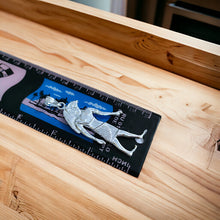Embrace ancient elegance with our Silver God Horus Pendant Necklace. Inspired by the majestic deity from Egyptian mythology, this pendant exudes timeless allure, blending intricate craftsmanship with symbolic significance dating back millennia.
- History: Inspired by ancient Egyptian mythology, symbolizing protection and power.
- Spiritually: Represents the god Horus, embodying strength, leadership, and divine protection.
- Talisman: Thought to ward off negative energy and bring blessings to the wearer.
- Handmade: Crafted with care and attention to detail, ensuring uniqueness and quality.
- Healing: Believed to promote physical and spiritual well-being, fostering inner strength and resilience.
- Material Silver: Made of sterling silver, enhancing its durability and elegance.
- Symbolism: Horus symbolizes sovereignty, vision, and the triumph of good over evil.
- How to Wear: Hangs elegantly on any chain up to 5mm thick, versatile for various styles and occasions.
- Ideal Gift: Perfect for someone seeking protection, empowerment, or a connection to Egyptian heritage.
History Side For Those Who Are Interested
Horus, one of the most significant deities in ancient Egyptian mythology, held a paramount position in the pantheon of gods throughout much of Egyptian history. The history of Horus is deeply intertwined with the mythology, religion, and culture of ancient Egypt, evolving over millennia of civilization along the Nile River.
The origins of Horus can be traced back to the predynastic period of ancient Egypt, around 3100 BCE, although his precise origins are subject to debate among historians and Egyptologists. He is often depicted as a falcon-headed god, symbolizing both kingship and the sky. Horus was associated with the ruling pharaoh, embodying the divine aspect of kingship and representing the living monarch's legitimacy and authority.
One of the most enduring and significant myths concerning Horus is the conflict with his uncle, Set, the god of chaos and disorder. According to legend, Set murdered Horus's father, Osiris, and usurped the throne of Egypt. Horus, determined to avenge his father's death and reclaim his rightful place as king, engaged in a protracted struggle with Set, which became symbolic of the eternal battle between order and chaos, good and evil.
The conflict between Horus and Set culminated in a series of epic battles and divine trials, with Horus ultimately emerging victorious, restoring order to the cosmos and securing his position as the rightful ruler of Egypt. This mythological narrative served to reinforce the Egyptian conception of kingship as a divine institution ordained by the gods, with the pharaoh acting as a living embodiment of Horus on Earth.
Horus was worshiped throughout Egypt, and numerous temples and shrines were dedicated to him across the land. He was often invoked for protection, particularly in times of war and conflict, and was believed to oversee the well-being and prosperity of the Egyptian people. Additionally, Horus was closely associated with the sun god Ra, forming a syncretic deity known as Ra-Horakhty, who represented the rising and setting sun.
Over time, the cult of Horus underwent various developments and adaptations, reflecting changes in Egyptian society and religious beliefs. Different forms and aspects of Horus emerged, including Horus the Child (Harpocrates), Horus the Elder, and Horus the Avenger, each with its own distinct characteristics and attributes.
The worship of Horus persisted throughout the dynastic periods of ancient Egypt, enduring even into the Greco-Roman period following the conquest of Egypt by Alexander the Great. Temples dedicated to Horus, most notably the famous Temple of Horus at Edfu, continued to be centers of religious activity and pilgrimage.
In conclusion, the history of Horus is a testament to the enduring significance of ancient Egyptian mythology and religion. As a symbol of kingship, order, and divine protection, Horus played a central role in shaping the religious beliefs and cultural identity of ancient Egypt, leaving an indelible mark on the history of civilization along the Nile River.






